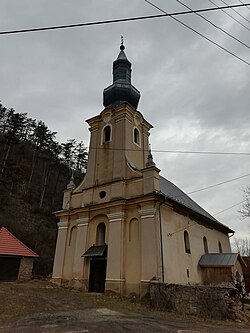This article includes a list of general references, but it lacks sufficient corresponding inline citations. (August 2020) |
Szinpetri is a village in Borsod-Abaúj-Zemplén county, Hungary. It has a population of approximately 250 people.[citation needed]
Szinpetri | |
|---|---|
 Reformed Church in Szinpetri | |
 Location of Borsod-Abaúj-Zemplén county in Hungary | |
| Coordinates: 48°29′07″N 20°37′26″E / 48.48517°N 20.62392°E | |
| Country | |
| County | Borsod-Abaúj-Zemplén |
| Area | |
• Total | 9.71 km2 (3.75 sq mi) |
| Population (2004) | |
• Total | 245 |
| • Density | 25.23/km2 (65.3/sq mi) |
| Time zone | UTC+1 (CET) |
| • Summer (DST) | UTC+2 (CEST) |
| Postal code | 3761 |
| Area code | 48 |
Location
editSzinpetri is a small village surrounded by hills in the state of Borsod-Abaúj-Zemplén. The neighbouring villages are Szin, Tornakápolna and Jósvafő.
Szinpetri is part of the Aggtelek National park which is a destinations for tourists, not only from Hungary, but from other countries as well.
The closest big city is Miskolc (about an hour away), but other towns like Edelény, Kazincbarcika and Kassa (in Slovakia) are pretty close too.[citation needed]
Name
editThe name of the village comes from a frequently used first name, Péter, which was probably the name of the founder.[citation needed]
Sights of the area
edit- The area's Paper Mill Building, contains the world's largest book,[citation needed] a Gutenberg Museum and a book collection that includes The Holy Bible.[citation needed]
- Close to the Paper Mill Building, a large representation of a salamander lizard can be seen on the hill which is about 93 meters long and made with small pieces of rock.
- In the middle of the village, stands a Reformed Church (built between 1792 and 1793) in which an exhibition can be found that displays facts about the historical life of the village.
- Destinations outside of the village include the neighbouring village Jósvafő and the Aggtelek Baradla caves.[citation needed]
Hunting
editThe area of the village is the home of hunters. Professionals spend 4-5 nights a week in the near forests.[citation needed]
In January and February they hunt for boars, foxes, deer, etc. (Boars can be hunted throughout the whole year.) In March, hunters mostly go for roes.[citation needed]
Hunters say it is necessary to rarefy the wild animals because they reproduce so quickly. However, they focus their hunt on the weak ones.[citation needed]
Sources
edit- Interviewing the local government, citizens and hunters[better source needed]
- http://legnagyobbkonyv.hu
- https://keptar.oszk.hu/html/kepoldal/index.phtml?id=31570
- http://www.tirek.hu/lap/szinpetri/cikk/mutat/bekoszonto/

